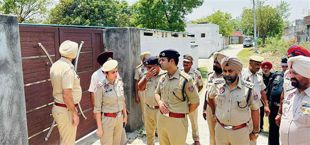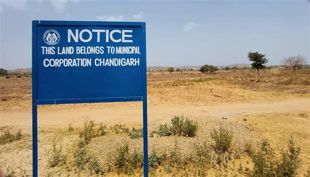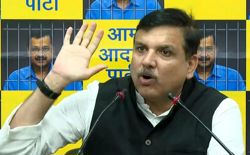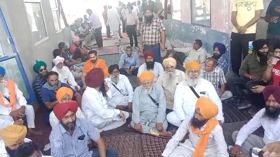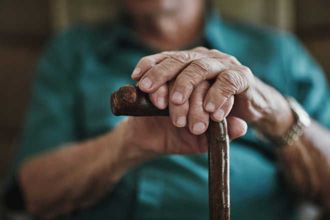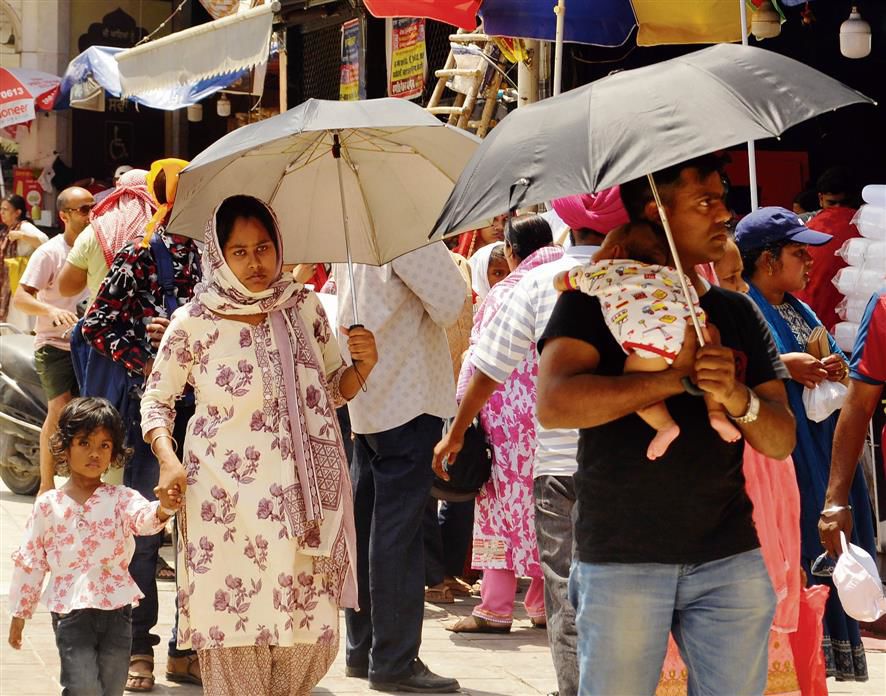
The summer heat is a normal and regular phenomenon but precautions are required to tackle unusual conditions. Photo Vishal Kumar
Preventive measures are required
Punjab Government has already started taking steps for protection from the heatwave. Advisories have been issued, schools and colleges closed. It is not just a case of this year, the problem appears to be grave even in future also. The authorities should ensure a complete ban on burning of wheat straw in the fields. A total ban on deforestation and extensive tree plantation is required. It should ensure effective public transport system to minimise the use of personal vehicles emitting hot and harmful fumes. Apart from schools and colleges, shopping malls and other public places should open after 3 pm to save electricity. People should be advised to save water and electricity. The more power and fossil fuels we use, the more carbon dioxide, a greenhouse gas, is emitted adding to the heating up of the environment. At places where people wait for services to be provided, the authorities should provide for drinking water and protection from sunlight. The public should follow routine advisories issued by the authorities.
Dr Bholla Singh Sidhu
24X7 power supply, medical aid required
To mitigate the effects of climate change, the foremost preventive measure that the government should take is to provide round-the-clock electricity supply. There should be no break-down of power. Secondly, awareness must be created amongst residents not to go out of their homes and offices until a dire need arises. Thirdly, uninterrupted water supply should be ensured along with installing of new taps and water cooling machines in various areas to provide relief to travellers from the heatwave. Last but not least, 24-hour availability of doctors for treatment of patients suffering from the effects of heatwave should be ensured in government hospitals by fixing their duties on a rotational basis.
Sanjay Chawla
Time to Reschedule office timings
Amritsar is not alien to extremely cold or extremely hot weather. People are quite used to working in the scorching heat of May-June and the biting cold of December-January. Before the advent of ACs, thick and wet coir mats hung on outer doors and windows kept room temperatures fairly bearable. Offices had ceiling fans or coolers. However, the present heatwave conditions seem to be unprecedented with mercury touching an alarming 50 degree Celsius. That warrants necessary measures if we must prevent heat strokes. People on a two-wheeler have to be doubly careful. A bare head will heat the skull. It must be covered with some moist towel or other thick cloth. The risk of dehydration is real these days. Hence, a glass of water, whether cold or not, must be taken before we venture out. It is a good idea to keep some water with you, just in case it is required. And heavy meals may preferably be avoided and local, indigenous fruits like melon, water melon, mango etc consumed to advantage. Saline ‘Jal jeera’, a local summer drink, replenishes loss of sodium on account of excessive sweating. Perhaps, our activities can also be rescheduled to avoid the hottest hours, i.e., the period from 10 am to 3 pm. Our sartorial choices should also be guided by the exigencies of summer. Since high summer temperatures will now be a recurrent phenomenon, the state government must think of rescheduling office hours to utilise the forenoon period and the evening hours. 9 am to 5 pm is not a divine law. Meanwhile, the frequency of bus service on all routes can be revised as per the changing passenger requirements. I have seen that the kids are comparatively safer at school and don’t have to face the hot sun because they have transport. Therefore, declaring holidays is no solution. In any case, this is climate change and we too must change accordingly.
Prof Mohan Singh
Take steps to control greenhouse gases
Increasing climate change is becoming a problem around the world. Every country is taking steps to reduce the negative effects of climate change. Now the point is what small steps should the administration take to tackle the heatwave that impacts the climate in cities. First, we should know the reasons for climate change which is the increase in greenhouse gases. Greenhouse gases trap the heat coming from the sun, leading to heating up of the environment. But large quantities of these gases will affect the balance on earth. These gases like carbon dioxide, methane and chlorofluorocarbons (CFCs) are increasing day by day due to anthropogenic activities (industrial pollution, mining, construction). The administration should take preventive measures to control these gases in which heat is trapped. Emphasis on colouring the road in white as it helps in reflecting back the sunlight instead of absorbing the heat for a long time may help. People should be made aware about using light colours to escape the heatwave. The administration should also increase the price of air-conditioners to discourage their use and promote wooden and fibre mats that absorb water and give cool air. Plant more trees at home and on roads. Install green sheds. Make the dwellers aware about the use of mud pots for water. These are small steps that the local government should take. It will give relief to inhabitants from the rising temperature.
Bharti Thakur
Integrated measures may help
Reducing vehicular traffic can significantly mitigate heatwave effect by lowering emissions of air pollutants and greenhouse gases like carbon dioxide and nitrogen oxides, which contribute to global warming and urban heat islands. Fewer vehicles on the road decrease direct heat emissions from engines and exhaust systems, leading to lower ambient temperatures, particularly in densely populated cities. Reduced traffic also means less formation of ground-level ozone, improving air quality and reducing heat intensity. Encouraging sustainable transportation methods such as walking, cycling and public transit further cuts emissions and supports green infrastructure development. Increasing urban greenery provides shade and cooling through evapotranspiration. To achieve reduced vehicular movement in cities where daily commute to offices and schools are necessary, a combination of strategies is essential. Enhancing public transportation by improving efficiency, reliability and coverage can make it a more attractive option. Promoting carpooling and ride-sharing, along with remote work and flexible working hours, can decrease peak-hour congestion. Implementing and expanding school bus programmes can reduce individual car trips. Developing cycling and walking infrastructure encourages non-motorised transportation. Congestion pricing in areas with dense traffic can discourage car use during peak hours. Establishing park-and-ride facilities allow commuters to switch to public transport, reducing city centre congestion. Public awareness campaigns highlighting the benefits of reduced traffic can foster a cultural shift towards sustainable commuting. By integrating these measures, cities can effectively reduce vehicular traffic, easing congestion, lowering emissions and mitigating heatwave impacts while ensuring efficient commuting to work and school.
Aarti Rana Chauhan
Provide drinking water facilities
The timings for drinking water supply should be increased from 5 am to 10 am, from 12 noon to 2 pm and similarly from 5 pm to 10 pm till the heatwave conditions prevail. During a heatwave, the consumption of water increases manifold as water is the only remedy to quench one’s thirst. 24X7 drinking water supply is available at bus stands and railway stations. The world is witnessing climate change in the form of rising temperature, and in some countries, excess of rains causing heavy floods that have changed the cycle of environment. Freak weather like heavy rains in the Middle-East and floods in Rajasthan, hailstorm at Mount Abu has been witnessed. The administration is busy in conducting parliamentary elections and the need of time is to arrange temporary shelters for the homeless in schools where they can stay at night. The administration should also make temporary arrangements for drinking water at specific places in the city so that the travellers on road can quench their thirst at these piaus.
Rajat Kumar Mohindru
Heatwave alert sounded In Punjab
The government has issued a red alert as the mercury has crossed 44 degree Celsius in Punjab. Ironically, a further rise in temperature is predicted by the Met Department during the coming days. Consequently, the citizens are likely to face many challenges, ranging from severe heatwave to other environmental complications. Among the big public inconvenience caused by such tropical weather is the scarcity of water, frequent power cuts and vector-borne diseases. It is, therefore, essential to take preventive measures to safeguard people from these hazards. To start with, the government has to arrange power from all available sources as its demand peaks in June due to paddy plantation season. Taking a rational decision, the Punjab government has advanced summer vacations in educational institutions. Likewise, timings in government offices should also be rescheduled to conserve some power. Proactively, the electricity department may resort to staggering domestic power cuts to divert supply towards the industry and agrarian sector. As regards the enhanced demand for water during summer, the civic authorities may introduce morning and evening supply to households for limited hours. Simultaneously, the people at large should be restrained from any wastage of water by washing cars and undue watering of garden areas. Furthermore, health services ought to be vigilant to deal effectively with seasonal ailments, while the public may also be regularly sensitised about the adverse climatic conditions. Rainwater harvesting for irrigation of crops and an afforestation drive to grow more trees require to be invigorated as a sustainable solutions to water crisis, power generation has to be augmented by tapping alternate solar and renewable means of energy to meet the rising demand. For instant relief from parching heat, temporary shelters and drinking water ‘chabeels’ may be arranged for humans, while water pots can be placed at various places for birds and animals. In the light of ongoing weather alert, civic societies, NGOs and government authorities must work in tandem for the immediate protection of the people and natural habitat from the severity of hot waves.
Nirmaljit Singh Chatrath
Live in present, find sustainable solutions
India is known worldwide for its extreme climates, be it the chilling cold or scorching heat. Similar is the case this year where the maximum temperature recorded in Jalandhar has been 44 degree Celsius. The department has predicted that a heatwave may strike the city in a few days. Thanks to advancing technology, we have the upper hand in preparing for the worst case scenario. First and foremost, the administration needs to implement a temporary reduction of operations in all factories and industries that emit greenhouse gases. This measure will help to mitigate the impact of these emissions and prevent further heating of environment. Secondly, Punjab is the victim of a vicious enemy of the environment, a practice, namely, stubble burning. The government should immediately enforce strict punishment against this illegal practice and make farmers aware of this harmful activity. Efforts to save the environment from the common man’s level are staying as much as possible inside one’s home and keeping a cool atmosphere with one common AC room to save energy, yourself and the planet. If in the extreme requirement, an individual needs to go out, one should apply sunscreen lotions, creams and use cooling cosmetic products to prevent rashes and sunburn. The government should provide ‘Public cooling tents’ and sections to the homeless and poor people who cannot afford the luxury of AC. Moreover, the Government of India has formed a plan to cater to such situations, namely, the ‘National Action Plan for Climate Change (2008)’. Our state government should take inspiration from it and execute all these steps to prevent further worsening of the situation. Last but not least, both the public and the government must undertake endeavours such as planting more and more trees (afforestation), reducing single-use plastic, producing clean cooking fuel and greening the railway system. Be aware of the present so that many more generations can live safely in the future.
Lakshit Jindal
Stubble burning most pressing concern
The government must hit the ground running to combat the ramifications of climate change-induced heatwave and other hazards, with stubble burning relatively being the most pressing concern for Punjab. The state must go all out, in sensitisation-penalisation and compensation-recognition of erring and dynamic farmers, else the situation may exacerbate. ‘Work from Home’ may even be considered for government and private employees, wherein physical absence doesn’t act as a deterrent in the smooth flow of operations, or the working hours may be relaxed, saving electricity and fuel, thus regulating emissions. Heatwave warnings and advisories, regarding hydration and limiting outdoor exposure must be continually issued. Vigilance must be maintained to ascertain that the forest fires from Himachal Pradesh do not descend to the region’s lower hilly areas. Above all, round-the-clock electricity and water supply must be provided to the households, as people battle the heatwave. Hope the government participates, with the same gusto, in this climate-change campaign, as is seen, while electioneering.
Anshika Kohli
Afforestation is need of the hour
The year 2023 has been recorded as the warmest year on the earth, with the IMD noting an increase in the frequency and duration of heatwaves, especially in northern India. Hence, to combat the heatwave and mitigate the effects of climate change, the government and the public must take certain preventive steps. First, the government should ensure a 24X7 uninterrupted power supply across the state and regular water distribution in urban areas, as these are two bare essentials for coping with extremely hot weather. Improving healthcare facilities in government clinics and hospitals to address various patient needs, and providing proper first aid, ice packs and necessary medicines for combating dehydration is also important. Although the government has closed the schools for summer vacation, the IMD should issue warnings and precautionary dos and don’ts on predicted heat waves to guide people to prepare for their safe stay. Additionally, the government should take stringent administrative measures to check large-scale stubble burning in rural areas and garbage burning in urban areas. Furthermore, afforestation is essential, hence, both the government and public should focus more on planting trees along with protecting existing ones. Providing relief to the people by enhancing seating capacity under the shade of old trees in parks is also recommended. Besides, the government should motivate, encourage and reward the socio-religious organisations and NGOs for providing round-the-clock drinking water at various strategic points like railway stations, bus stand and other public places.
Dr Kulwant Singh Phull
TAKE drastic STEPS TO BEAT THE HEAT
Severe heatwave conditions have warranted the Met Department to issue a red alert in view of temperatures expected to cross 47 degree Celsius mark in the next four five days. The state government’s decision of preponing the beginning of summer vacation in schools from June 1 to May 21 is appreciable. Change in timings of offices is still pending. While the government needs to issue alerts in the media, both print and social, to make the public fully aware of the situation and take all preventive steps to beat the heatwave, the health machinery should also be kept fully prepared to deal with emergency cases. A heat action plan as per Government of India guidelines should be prepared at the local level for implementation. While dealing with the phenomenon of climate change requires long-term strategic measures, to deal with the present heatwave, preventive measures can be taken. Some temporary shelters can be erected at prominent places to save people from scorching heat. These places can be equipped with essential facilities such as drinking water etc. The services of NGOs and big corporate house can be synchronised in this regard. Garbage burning and putting leaves on fire by the people and the municipal employees should be strictly stopped. The unabated burning of crop stubble by the farmers also needs to be tackled on a war footing.
Jagdish Chander
Question for next week
With polling for the seventh and last phase of the General Election for the 18th Lok Sabha slated for June 1, what are the main issues that the candidates and political parties should address on priority?
Suggestions in not more than 200 words can be sent to [email protected] by Thursday (May 30)
Join Whatsapp Channel of The Tribune for latest updates.





















